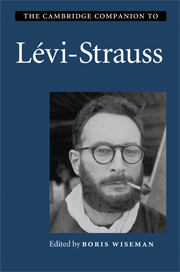Introduction
Published online by Cambridge University Press: 28 January 2010
Summary
The chapters in this volume aim to demonstrate the continuing relevance and productiveness of Lévi-Strauss's writings for an understanding of the contemporary world. They are emphatically turned towards the future of Lévi-Strauss's ideas and theories, their future not only for anthropology, but also philosophy, aesthetics, literary criticism, politics and other areas still. Such an aim does not imply an unconditional acceptance of his ideas, of 'structuralism' or of any kind of orthodoxy. Far from ignoring the criticisms and controversies that have surrounded the dissemination of Lévi-Strauss's thought, these essays have made criticism, contestation and opposition central to the movement forward that they attempt. In The Raw and the Cooked (1964a; 1969d; 1970), Lévi-Strauss traces a series of narrative inversions that show that a Bororo myth about the origin of rain-water (the 'reference myth' M1) is a transformation of a group of myths (M7-12) told by a neighbouring Gé population, about the origin of fire. Myths die out, we subsequently learn, when they cease to engender transformations or when they can only transform by becoming something else: a legend, a novelette or simply history. The same could be said about the works of any major thinker; they die out when they cease to engender transformations. The fundamental aim of the readings that follow is to partake in the transformational process, to reread and thereby reinvent the meaning of a series of texts that are far from having exhausted their generative potential, their ability to give rise to new variants that, like the myth-become-legend, break with the past and provide new points of departure. The condition of such transformations is attentiveness to the letter of Lévi-Strauss's texts, to their explicit and implicit fabric of meaning. The readings that follow do not simplify or reduce complex ideas to convenient sound bites. But neither do they unnecessarily obscure or mystify an author often deemed to be difficult.
- Type
- Chapter
- Information
- The Cambridge Companion to Lévi-Strauss , pp. 1 - 16Publisher: Cambridge University PressPrint publication year: 2009
- 1
- Cited by



